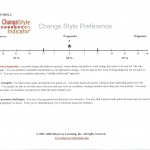How do you handle change? That’s a question that was recently addressed in a class I’m taking called Impact Greensboro.
Participants were recently asked to take an online assessment called the Change Style Indicator (Discovery Learning), and I wanted to share some of what I learned with you. After all, knowing how you function, and the personality traits of others could go a long way.
Here’s some information about the assessment from DiscoveryLearning.com,
“The Change Style Indicator is a change management assessment designed to measure preferred styles in approaching and dealing with change. The Change Style Indicator identifies strengths and pitfalls of change style characteristics. Knowing one’s change style preferences can allow individuals to work together as a team, revising work processes and delivering more satisfactory results. It looks at factors that can impact an organization’s readiness to deal with and sustain change in challenging times.
Your score on this change management assessment tool will place you on the change style continuum ranging from a Conserver style to an Originator style. A third style, the Pragmatist, occupies the middle range of the continuum.”
According to the information on the Web site, most individuals are “a blend of Conserver-Pragmatist or Pragmatist-Originator; however, the degrees of blending are identifiable.”
Prior to the facilitator passing out the results of the assessment, she talked about change and the fact that it’s very hard for people to fundamentally change.
I didn’t necessarily agree (purpose of the class is to provoke thought and discussion) so I raised my hand and asked,
“Isn’t it possible for people to change by taking in information and being exposed to new scenarios throughout life?”
She then said,
“It is possible, but typically very hard for most people. But I’m very interested to see what category you are in.”
At that point I became curious as to what “category” the assessment placed me in, but before the results were handed out she took some time to outline the characteristics of each group. For brevities sake I’ve pulled some highlights from the assessments online brochure,
Conservers
- Accept structure Prefer retaining existing systems and paradigms
- Prefer gradual change
- May appear cautious and inflexible but do ask the hard, detailed questions
Pragmatists
- Explore structure
- Operate as mediators and catalysts
- Prefer change that best serves the function
- May appear reasonable, practical and flexible but also noncommittal
Originators
- Challenge the structure
- Enjoy risk and uncertainty
- Prefer quicker, more expansive and radical change
- May appear disorganized and undisciplined but are original thinkers
The Scale
Now, picture a line scale. Conservers are to the left, Pragmatists are in the center and Originators are to the right. Your score determined where you fell on the line and what category you were placed in. For example, you could be a Pragmatist but fall on the Conserver side of the scale.
 Now that I’ve done a less than stellar job of painting that picture, click the image to the left to see the actual scale, and my results.
Now that I’ve done a less than stellar job of painting that picture, click the image to the left to see the actual scale, and my results.
Did you notice where I fell on the scale? Smack dab in the center. That makes perfect sense to me, and it did to the facilitator as well.
Some additional info from my results are below (can also be seen by clicking the image above).
“As a true pragmatist, you prefer change that addresses specific, real problems and prefer to avoid change that seems to be only for “the sake of change.” You are practical, reasonable and flexible in you approach to change. You are open to new ways of doing things but not too quick to commit. You may serve as a mediator and prefer a “middle-of-the=road” approach.
Your strengths: You like to have goals and objectives to guide you. You foster teamwork and are willing to share leadership and power with others. You usually are able to see both sides of an issue and may serve as a mediator, valuing resolution more than your own position. You study and learn from your mistakes and tend not to make the same mistake twice.
Your potential challenges: You may value agreement and harmony over outcomes. You may find it hard to make quick decisions and you may be seen as ‘flip-flopping” on issues. It may prove challenging for you to formulate long-term strategies.”
Let me addresss the sentence in my summary that said, “may prove challenging for you to formulate long-term strategies.”
I don’t necessarily see this as a problem for myself because I don’t typically have a hard time forming my own opinion or making a decision. If for some reason I did find myself “stuck,” I would look for data (Or looking at rationale from Conservers) to help me lean one way or the other.
I can’t help but think it is important for groups that work closely together to have an understanding of who is a Conserver, Pragmatist or Originator. This knowledge could create a better working environment and provide a small amount of insight into how others process change.